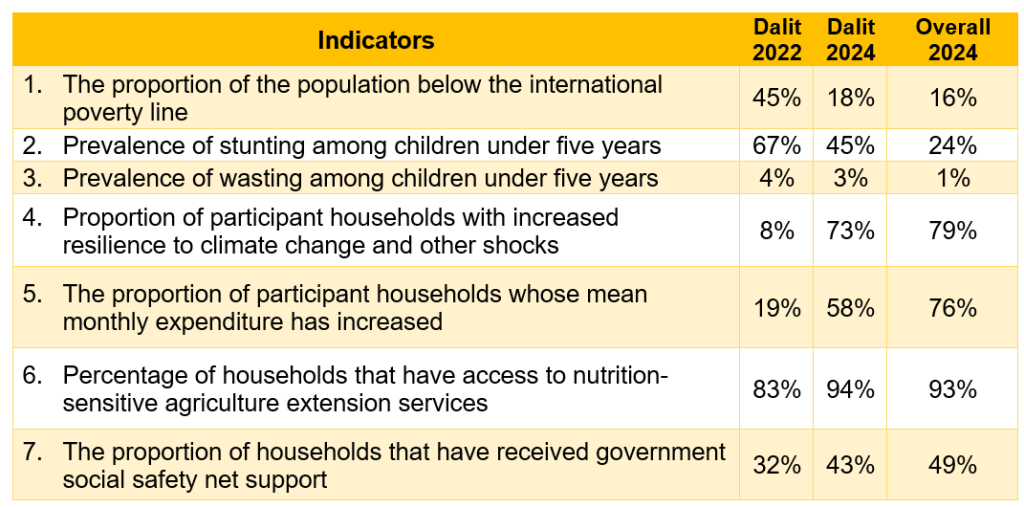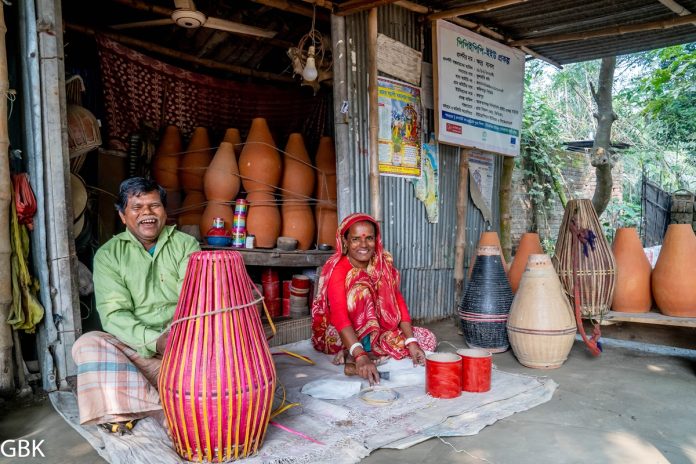The Dalit community in Bangladesh comprising approximately 3.83% of the total population (source: International Dalit Solidarity Network), historically known as ‘Harijan’ or ‘untouchables’, is marginalised by religious sanctions and socio-economic discrimination. The term Dalit, which originated from the Sanskrit, means ‘divided’, ‘deprived’ or ‘broken’. The Dalits are referred to as the lowest class in the traditional Hindu caste system and a minority group that faces oppression, exploitation and deprivation based on social and economic differences.
Bangladesh’s Dalit community experiences social inequality, lacks education, has limited employment and economic opportunities, possesses little or no land to live on or cultivate and cannot raise their voices for their fundamental rights. They struggle to access public and private services, especially healthcare and education, and are highly unlikely to be covered by the social safety net.
The Dalits are forced to work under abominable conditions for the least return on their labour. Traditionally, Dalit people serve as cobblers, blacksmiths, barbers, potters, sweepers, seasonal agricultural day labourers, and wage labourers such as construction workers or bricklayers. However, they often remain unemployed for extended periods or must borrow money to survive.
The progressive Dalit community
The PPEPP-EU project has been working to improve the socio-economic status and livelihood conditions of extremely poor people and other intersectional groups, including the Dalits. Influencing behavioural change in the Dalit community presents a significant challenge, as they show little inclination to alter their traditions. Embracing this challenge, the PPEPP-EU project engages with 3,724 Dalit households, around 1.73% of its 215,000 target households, to address their multidimensional poverty. The project offers financial services (loans, grants, savings, and risk mitigation), climate-smart farm and off-farm technologies, vocational and skill training, technical assistance, market linkage and value-chain interventions to establish resilient livelihoods for them. It also ensures health, nutrition and disaster management services for Dalit members and connects them with government safety net programmes.
PPEPP-EU’s multifarious interventions and services have significantly contributed to the Dalit community’s development, with their income, expenditures, and marketable assets improving gradually over the project tenure. The percentage of Dalit families living below the international extreme poverty line (PPP $2.15 per capita per day) has decreased from 45% in 2022 to 18% in 2024. Simultaneously, their per capita income has risen significantly from BDT 2,391 to BDT 4,739. Here is a glimpse of the progress of the PPEPP-EU’s Dalit households studied under the project.
Table: Progress of socio-economic conditions of Dalit people in PPEPP-EU during 2022-2024 (Source: PPEPP-EU’s Results-Based Monitoring 2022-2024)

Sustainable livelihood holds the key
With financial and technical support from PPEPP-EU, the Dalit households have established various income-generating activities (IGAs) based on their skills and abilities, resulting in a diverse range of income sources. Some members are involved in cow fattening, goat and sheep rearing in a slatted house, duck and chicken rearing and vegetable cultivation in their homesteads. Certain Dalit families have engaged in fish farming, transporting fish in oxygenated vans and producing fishing gear. Additionally, some participate in high-yielding rice and high-value crop cultivation and safe vegetable/fruit farming on arable land. After receiving appropriate training, many have undertaken off-farm and vocational IGAs, including bamboo and cane product making, mobile servicing, tailoring, agricultural product processing and marketing, and small businesses.
All these members have received a wide range of support, including financial assistance to initiate their IGAs, hands-on training to enhance their skills and technical services such as vaccination and deworming. Almost all (94%) of the Dalit households involved in agricultural activities in 2024 under PPEPP-EU have access to nutrition-sensitive agriculture extension services, compared to 83% in 2022.
Improved health and nutrition
Changes in Dalit families’ nutrition and food habits are significant due to the project’s direct and indirect nutrition activities. Now, Dalit mothers exclusively breastfeed their babies for up to six months before introducing complementary foods. Children aged 6-59 months receive vitamin A twice a year. Pregnant mothers in the Dalit community regularly attend ANC/PNC checkups and take nutritional supplements such as iron, folic acid, and calcium. Dalit households now focus on family planning, using clean water for cooking, washing their hands with soap before meals, and maintaining cleanliness and hygiene at home.
They also meet their family’s nutritional needs by growing vegetables and raising poultry in homesteads. Their dietary quality and general health have improved, as by 2024, the stunting rate among children under five years old decreased to 45% from 67% in 2022. Although health and nutrition awareness have improved the nutritional status of their under-5 children, adolescent girls and pregnant and lactating mothers, it needs further improvement to match the national level.
Serving persons with disabilities
Dalit households having persons with disabilities (PWDs) have engaged in various income-generating activities under the project. They have been included as members of the PWD Forum, a social platform established by PPEPP-EU to help PWDs claim their rights and entitlements. As forum members, they receive appropriate guidance on how to get involved with IGAs that are appropriate for their conditions. They also receive assistive devices like wheelchairs and hearing aids to enhance mobility and communication. Many have obtained the ‘Suborna Nagorik’ card (disabled people’s identification card issued by the government) and are receiving disability allowance.
Linkage to government services and safety net programmes
PPEPP-EU has been working to create better access to public services for Dalit families. Many Dalit members are now included in the government’s social safety net programmes, such as maternity, disability, elderly, Harijan, and widow’s allowances, VGD, government housing facilities, and education stipends. The Dalit households that have received government safety net support have increased from 32% in 2022 to 43% in 2024. They are also assisted in the application process for support from the local Union Parishad and other government services.
Linkages have been established to include Dalit members in various government training programmes on livestock, agriculture, and fisheries and to obtain crop seed, fertiliser, breed, fingerling and vaccination grants. They have also been connected to local healthcare facilities for critical medical treatment services, such as the Community Clinic and the Upazila Health Complex.
Sanmoni’s success is exemplary for others in the Dalit community
Sanmoni Soren (32) is a Dalit ethnic minority member of the PPEPP-EU project from Birampur upazila of Dinajpur district. The two-membered family had a difficult life, as her husband, the sole earner, had a meagre income from seasonal agricultural day labour.
In 2023, Sanmoni received grants with technical assistance for high-value vegetable cultivation. She started producing hybrid chillies on 20 decimal land and achieved a good profit. Sanmoni extended her farming area the following year by leasing 100 decimal land. She took a BDT 70,000 loan from Gram Bikash Kendra (GBK), an implementing partner of PPEPP-EU and cultivated high-value vegetables. She received guidance from the project’s livelihood technical officers on how to grow her vegetable farm.
Later, Sanmoni bought cattle for fattening in search of diversified income sources. Sanmoni and her husband have a good connection with the local vegetable market actors and livestock extension service providers.
Previously, her wage-earning husband would get around BDT 10,000 a month, but now they make between BDT 25,000 and BDT 30,000 per month together. Recently, she repaired their dilapidated home and made it into a new brick-walled home. Sanmoni said, ‘With our increased earnings, we feel socially accepted and dignified now, thanks to the PPEPP-EU project.’


